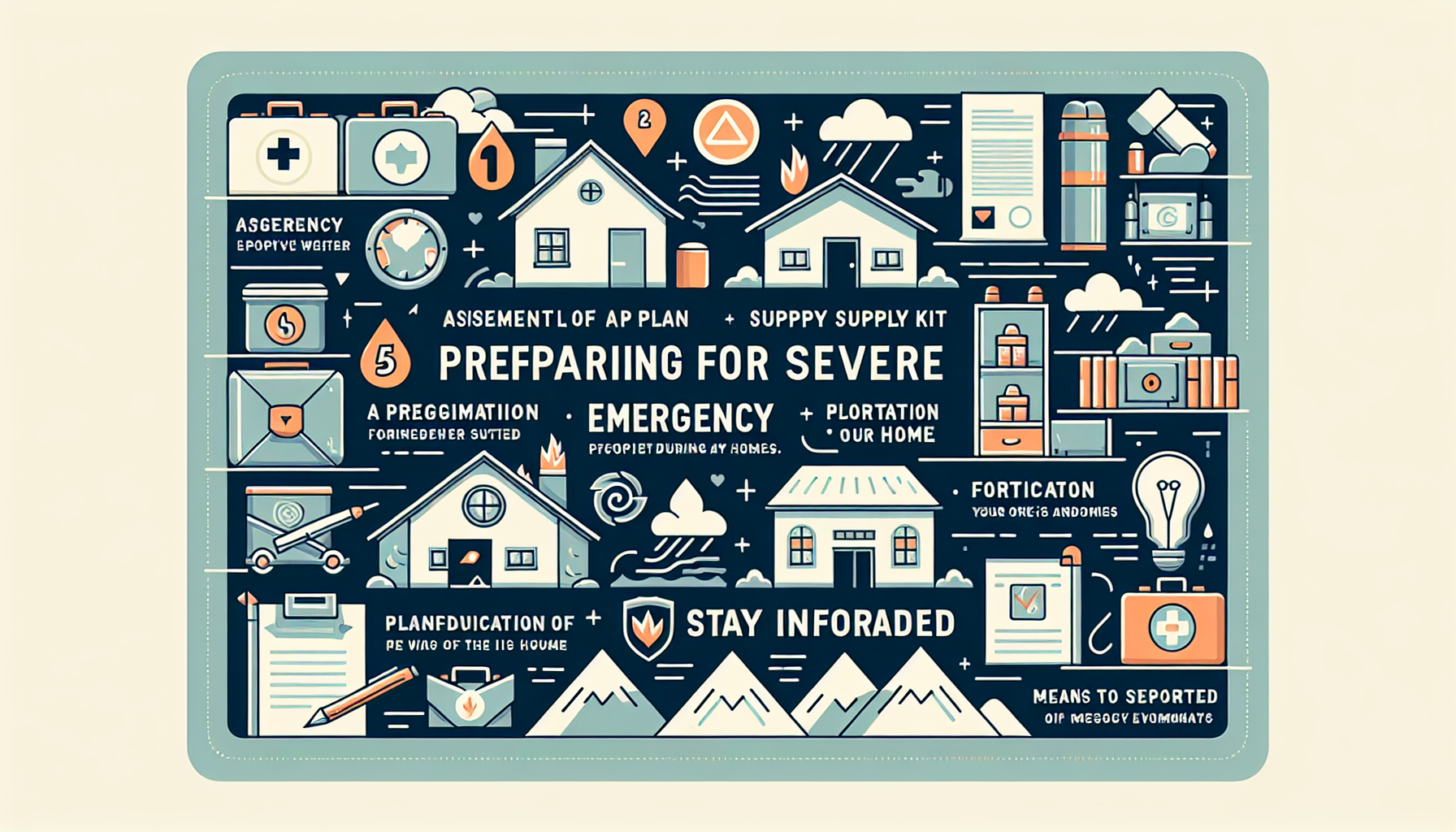Severe weather events can strike unexpectedly, leaving you and your loved ones vulnerable and unprepared. That’s why it’s essential to be equipped with the best ways to prepare for these situations. Whether it’s a hurricane, tornado, or blizzard, taking the necessary steps to safeguard yourself and your home can make all the difference in staying safe. From creating an emergency kit to developing an evacuation plan, this article will provide you with practical tips and techniques to ensure you’re ready to face any severe weather event head-on.
Prepare an Emergency Kit
Water
Water is an absolute necessity in any emergency situation. Make sure to have at least one gallon of water per person per day for a minimum of three days. This will ensure that you and your family have enough water for drinking, cooking, and hygiene purposes. It is also essential to store water in clean containers and replace it every six months.
Food
Having an ample supply of non-perishable food is vital during severe weather events. Stock up on items like canned goods, dry fruits, nuts, and ready-to-eat meals that require no refrigeration or cooking. Make sure to choose foods that have a long shelf life and meet the dietary needs of everyone in your household. Aim to have at least a three-day supply of food for each person.
Medications
If you or anyone in your household relies on prescription medications, it is crucial to have an adequate supply on hand. Keep a seven to ten-day supply of medications in a waterproof container to protect them from damage. Additionally, consider including over-the-counter medications for common ailments and any necessary medical supplies, such as bandages and antiseptics, in your emergency kit.
Flashlights
Power outages are common during severe weather events, so it’s essential to have a reliable source of light readily available. Flashlights with extra batteries should be included in your emergency kit for each member of your household. LED flashlights are particularly recommended for their energy efficiency and durability.
Battery-powered radio
During emergencies, staying informed about the latest developments is vital. A battery-powered radio will allow you to receive critical information, such as weather updates and safety instructions, even when other communication channels are down. Make sure to include extra batteries for your radio in your emergency kit.
First aid kit
Injuries can occur during severe weather events, so having a well-stocked first aid kit is essential. Include items such as adhesive bandages, sterile gauze pads, antiseptic wipes, tweezers, scissors, and pain relievers. Familiarize yourself with the contents of your first aid kit and make sure everyone in your household knows how to use it effectively.
Extra cash
In situations where power is out and electronic payment systems are down, having some extra cash on hand can be invaluable. ATMs may not be functioning, and stores may only accept cash during emergencies. Keep a reasonable amount of small bills in your emergency kit to ensure you can purchase necessary supplies or services if needed.
Important documents
Protecting important documents is crucial to recovering after a severe weather event. Keep copies of essential documents in a waterproof and fireproof container. These documents may include identification papers, insurance policies, medical records, and proof of address. It’s also advisable to have electronic copies stored securely on a portable hard drive or in the cloud.
Emergency contact information
Maintaining a list of emergency contact information is crucial in times of crisis. Include phone numbers for local emergency services, nearby relatives or friends, doctors, and insurance providers. Ensure that every member of your household has access to this list, whether it’s in their personal emergency kit or stored on their phone.
Develop an Emergency Plan
Create a communication plan
During a severe weather event, communication may be challenging, with phone lines and internet connections disrupted. It is essential to establish a communication plan with your loved ones. Decide on a primary out-of-area contact person who can relay messages between family members. Make sure everyone knows how to reach this person and establish alternative methods of communication, such as walkie-talkies or two-way radios.
Designate a meeting place
In case of an evacuation or separation during a severe weather event, it’s crucial to have a designated meeting place where everyone can gather. Choose a location that is easily accessible and familiar to all family members. Ensure that everyone knows the address and how to get there safely. If possible, select a secondary meeting place in case the primary location is inaccessible.
Establish evacuation routes
Knowing the evacuation routes in your area is essential for safely navigating through severe weather events. Research and map out primary and alternative evacuation routes and become familiar with them. Make sure everyone in your household knows the routes and where to meet if an evacuation order is issued.
Practice emergency drills
Regularly practicing emergency drills with your family will help ensure everyone knows what to do in case of severe weather. Conduct drills for various scenarios, such as sheltering in place or evacuating. Time your drills and identify areas for improvement. Practice makes perfect, and being prepared can save lives.
Identify essential utilities and shut-off locations
Know how to shut off utilities such as gas, water, and electricity in your home. Label the shut-off valves and switches, and make sure everyone in your household knows their locations. Having this knowledge will help prevent further damage during emergencies and ensure the safety of you and your family.
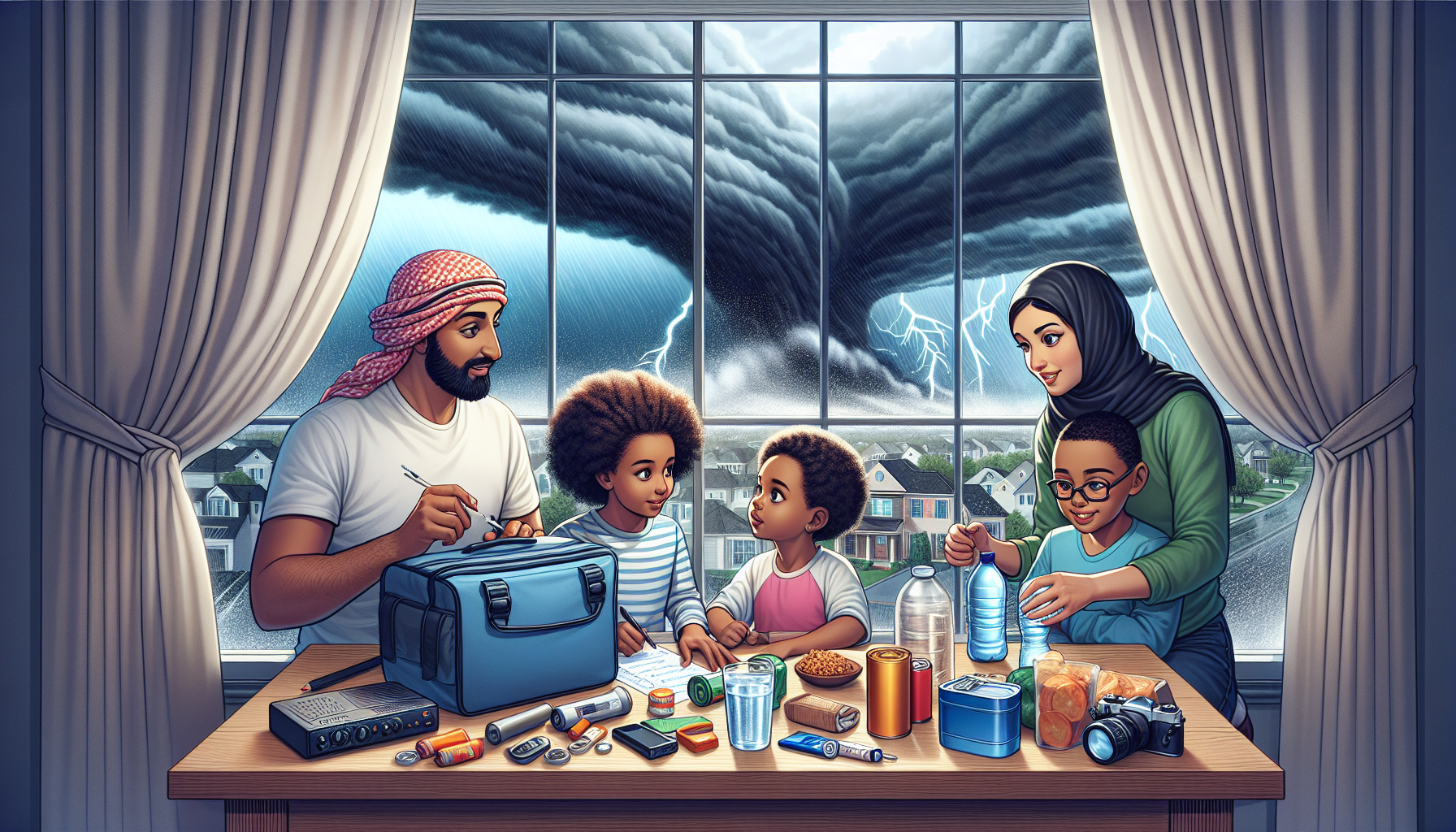
Stay Informed
Monitor weather alerts
Stay informed about weather conditions and potential hazards by monitoring weather alerts from trusted sources. Pay attention to weather warnings, watches, and advisories issued by local meteorological agencies. These alerts will provide crucial information about upcoming severe weather events, allowing you to take necessary precautions.
Use reliable sources of information
With the prevalence of social media and wide-ranging news sources, it is essential to rely on reputable and official sources of information during severe weather events. Local emergency management agencies, national weather services, and government websites are typically reliable sources. Avoid spreading or trusting unverified information that may cause unnecessary panic or confusion.
Subscribe to emergency notification systems
Many communities have emergency notification systems in place that can provide critical updates during severe weather events. Sign up for these systems by visiting your local government’s website or contacting your local emergency management agency. These notifications can be delivered via phone calls, text messages, or email, ensuring you receive timely information about safety measures and evacuation orders.
Follow local emergency management agencies on social media
In addition to subscribing to emergency notification systems, following local emergency management agencies on social media platforms can provide you with real-time updates and instructions during severe weather events. Many agencies use platforms such as Twitter and Facebook to disseminate important information. Make sure to enable notifications from these accounts to receive immediate updates.
Secure Your Property
Trim and remove trees
Trees can become hazardous during severe weather events, especially if they are dead, diseased, or have overhanging branches. Regularly trim trees to remove any weak or damaged branches that could potentially fall and cause damage to your property or pose a risk to your safety. If necessary, consult with a professional arborist to assess the overall health of your trees and determine if any need to be removed.
Secure loose objects
Strong winds accompanying severe weather events can turn loose objects into dangerous projectiles. Secure outdoor furniture, grills, trash cans, and any other items that could potentially be picked up and carried by the wind. Store or tie down items that cannot be secured, such as bicycles or lawn equipment, to prevent them from causing damage during high winds.
Reinforce windows and doors
Protecting your windows and doors is crucial during severe weather events. Install storm shutters or use plywood to cover windows and doors, particularly those facing the direction of prevailing winds. Reinforcing these openings will help prevent wind and debris from entering your home, reducing the risk of damage and injury.
Install a generator or backup power source
Power outages are common during severe weather events, so it’s a good idea to have a backup power source. Consider installing a generator that can provide electricity to essential appliances and equipment. Make sure to follow safety guidelines and consult a professional for installation and maintenance.
Elevate equipment and utilities
If your property is prone to flooding, it’s essential to elevate valuable equipment and utilities to prevent damage. Raise electrical panels, HVAC systems, appliances, and any valuable equipment onto elevated platforms or mountings. This will help protect them from floodwaters and minimize potential damage or electrical hazards.
Anchor outdoor furniture
During high winds, outdoor furniture can be easily lifted and thrown, causing damage to property and posing a threat to safety. Anchor furniture securely to the ground or store it indoors during severe weather events. Use straps or stakes to secure items such as umbrellas, canopies, and tents to prevent them from being blown away.
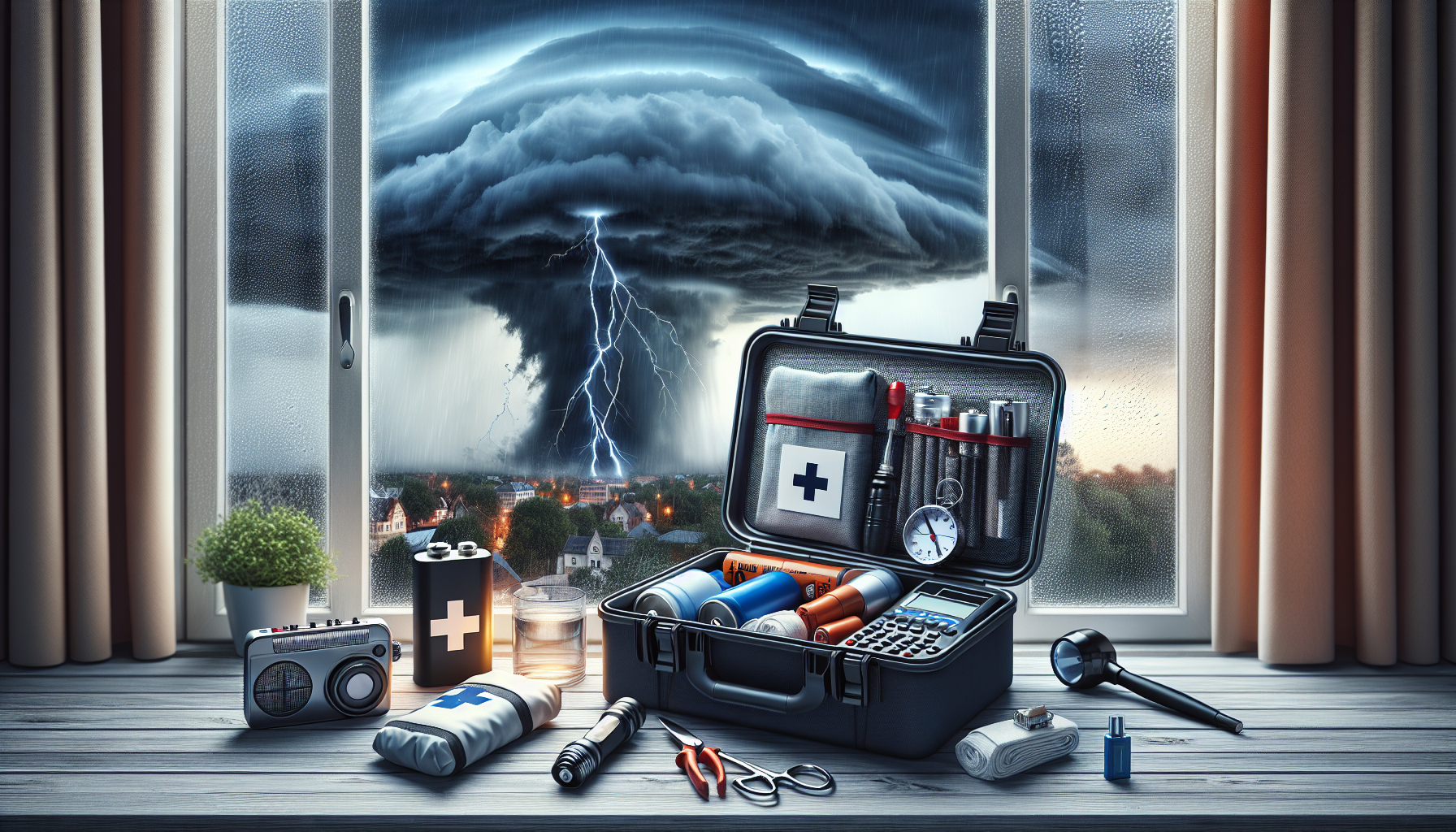
Prepare Your Home
Know how to shut off utilities
In an emergency situation, knowing how to shut off utilities can prevent further damage or danger. Familiarize yourself with the location and operation of shut-off valves for gas, water, and electricity in your home. Make sure everyone in your household knows how to turn off these utilities as well.
Secure valuable possessions
Protecting your valuable possessions is essential during severe weather events. Store important items such as jewelry, documents, photographs, and sentimental objects in waterproof and fireproof containers. Consider using a safe or renting a safety deposit box at a local bank to provide an added layer of protection.
Store important documents in waterproof containers
Keep copies of important documents, such as birth certificates, passports, insurance policies, and property deeds, in waterproof containers. These documents may be necessary for insurance claims and other recovery processes following a severe weather event. Additionally, take photos or scan important documents and store them electronically as a backup.
Create a home inventory
Creating a detailed inventory of your belongings will help streamline insurance claims and expedite the recovery process after a severe weather event. Document your possessions room by room, listing their value, purchase date, and any relevant receipts or documentation. Take photos or videos as visual evidence of your belongings.
Consider flood insurance
Standard homeowners’ insurance policies typically do not cover damage caused by flooding. If you live in an area prone to flooding, it is crucial to consider purchasing flood insurance. Flood insurance policies provide coverage for damage to your property and belongings caused by floodwaters, ensuring you have the necessary financial support for recovery.
Protect Your Health
Stay up to date with vaccinations
Keeping up with vaccinations is essential for safeguarding your health, especially during severe weather events when access to medical services may be limited. Ensure that everyone in your household is up to date with routine vaccinations, including tetanus shots. Consult with your healthcare provider to determine if any additional vaccinations are recommended based on your location and potential risks.
Maintain a supply of necessary medications
If you or anyone in your household relies on prescription medications, it is crucial to have an ample supply in preparation for severe weather events. Make sure to refill prescriptions before they run out and keep a seven to ten-day supply on hand. Rotate medications regularly to ensure their freshness.
Plan for special medical needs
If you or a family member have special medical needs, develop a plan to address them during a severe weather event. Ensure you have an adequate supply of necessary medical equipment, such as oxygen tanks or mobility devices. If you rely on electricity for medical devices, consider backup power sources or alternative arrangements in case of power outages.
Ensure access to clean water and food
During severe weather events, access to clean water and food may become limited. To protect your health, have a supply of bottled water and non-perishable food items that can sustain you and your family for at least three days. Consider dietary restrictions and special needs when selecting food items for your emergency kit.
Protect against mosquito-borne illnesses
In some regions, severe weather events can lead to an increase in mosquito populations, increasing the risk of mosquito-borne illnesses. To protect yourself, make sure to eliminate standing water around your property where mosquitoes can breed. Use insect repellents and wear protective clothing to reduce exposure to mosquitoes.
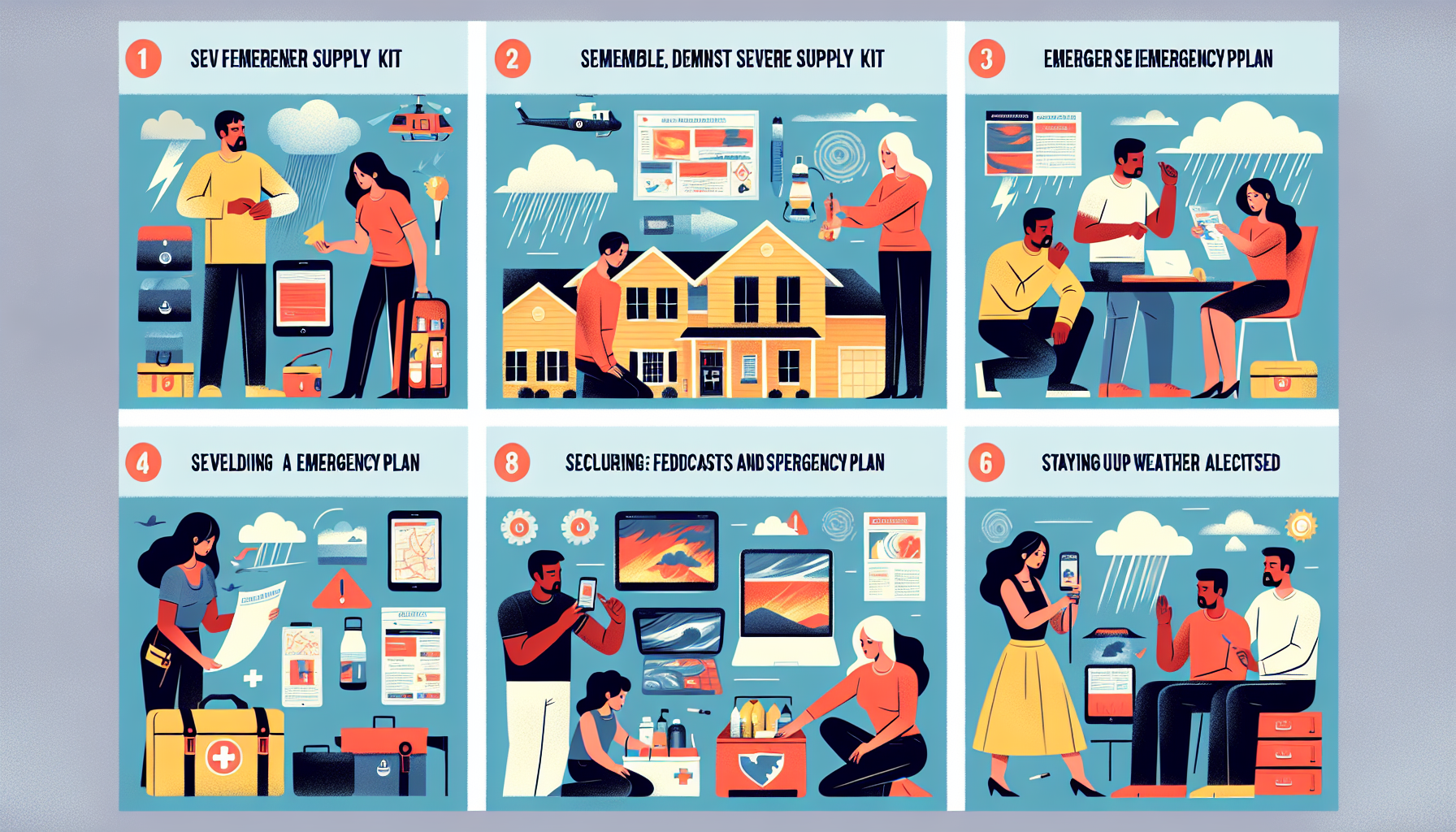
Prepare Your Vehicle
Check tires, brakes, and fluids regularly
Maintaining your vehicle’s overall condition is crucial for safe travel during severe weather events. Regularly check your tires’ tread depth and air pressure, inspect the brakes for proper functionality, and ensure all fluid levels are optimum. If needed, have a professional mechanic conduct a comprehensive inspection to address any underlying issues.
Keep a full gas tank
Having a full gas tank is essential during severe weather events. Power outages can disrupt fuel availability, and gas stations may be closed or have long lines. To ensure mobility and the ability to evacuate if necessary, aim to keep your vehicle’s gas tank at least half full at all times. Top it up well in advance of any predicted severe weather events.
Pack a roadside emergency kit
A well-equipped roadside emergency kit can provide you with essential tools and supplies in case you encounter any issues while traveling during severe weather events. Include items such as a spare tire, jack, jumper cables, emergency flares, flashlight, and basic repair tools. Also, include emergency blankets, water, and non-perishable snacks in case you become stranded.
Prepare for winter driving conditions
If you live in an area that experiences severe winter weather, it’s essential to prepare your vehicle for these conditions. Equip your vehicle with snow tires or chains, keep an ice scraper and snow brush in the car, and have a ready supply of windshield washer fluid formulated for cold temperatures. Make sure you’re familiar with safe driving techniques in winter conditions and adjust your speed and following distance accordingly.
Have a backup plan if traveling during severe weather
If you must travel during severe weather events, it’s crucial to have a backup plan in place. Stay updated on weather forecasts and road conditions. Consider alternative routes, means of transportation, or postponing non-essential travel if conditions are hazardous. Inform someone of your travel plans, including your route and expected arrival time.
Take Care of Pets
Prepare an emergency kit for your pet
Pets are part of our families, so it’s important to include them in emergency preparations. Put together an emergency kit specifically for your pet, including a supply of food, water, medications, and any necessary pet care items. Don’t forget to add familiar blankets or toys to help keep your pet comfortable during stressful times.
Ensure identification for your pet
Make sure your pet is wearing an identification tag with up-to-date contact information. Consider microchipping your pet as an additional form of identification. In case of separation during a severe weather event, proper identification will increase the chances of being reunited with your pet.
Identify pet-friendly shelters or hotels
Not all emergency shelters or hotels allow pets, so it’s important to identify pet-friendly options in your area. Know the locations and requirements of these facilities in advance. If you have multiple pets, confirm if there are any limitations on the number or types of animals allowed.
Make a pet care plan
In the event of an evacuation or extended emergency situation, have a plan for your pet’s care. Identify a trusted friend, neighbor, or pet boarding facility that can temporarily care for your pet if needed. Make sure this person or facility is aware of your pet’s needs and any medical conditions or dietary restrictions.
Keep your pet’s vaccinations up to date
Ensure your pet’s vaccinations are up to date, particularly if boarding them or staying in a pet-friendly shelter is a possibility during severe weather events. Vaccinations protect your pet from potentially contagious diseases, making them less vulnerable in stressful situations.
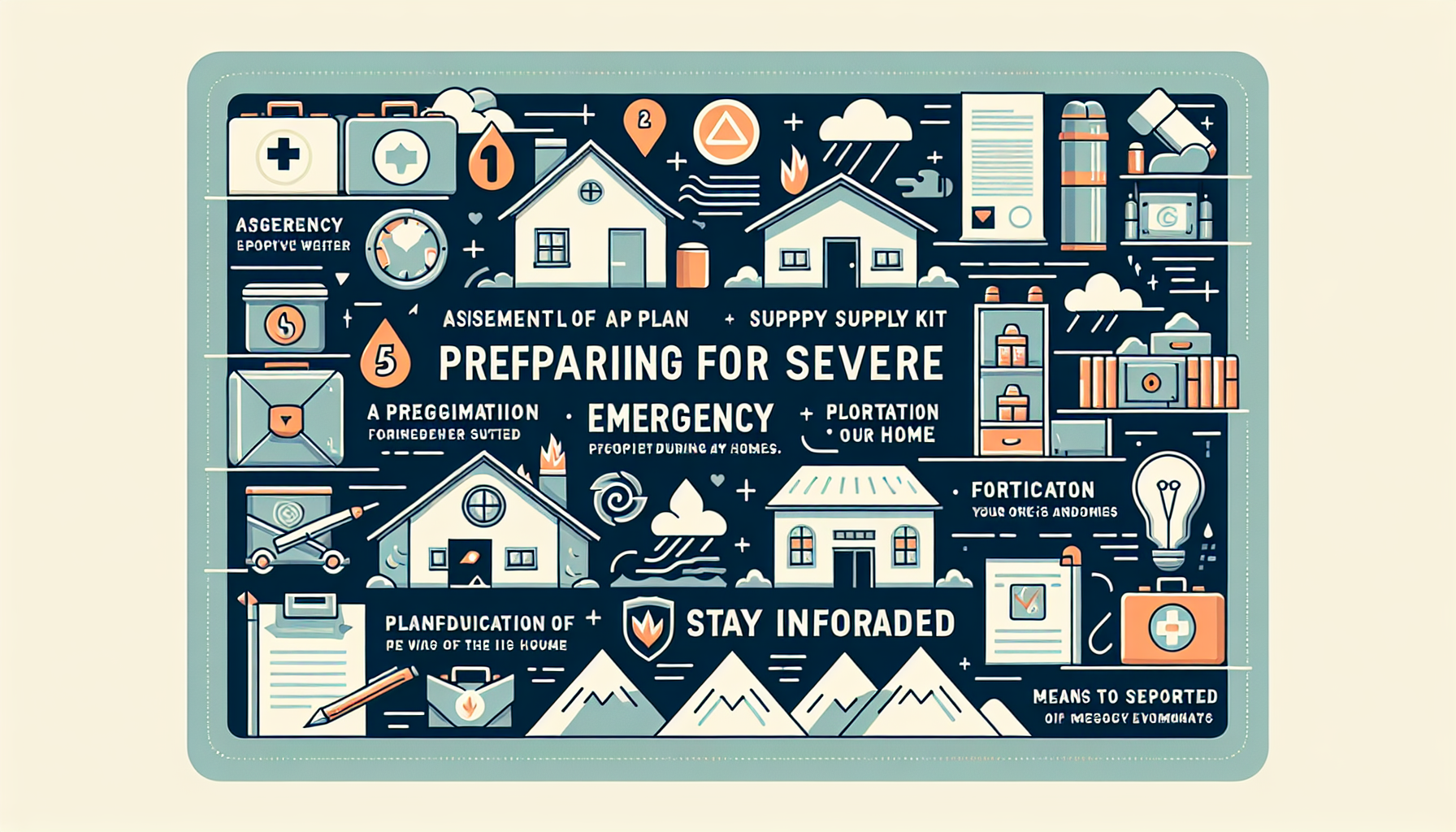
Stock Up on Supplies
Non-perishable food items
Having a stock of non-perishable food items is essential for any emergency situation. Choose items that have a long shelf life and require no refrigeration or cooking, such as canned goods, energy bars, and dried fruits. Ensure you have enough food to sustain your household for at least three days.
Bottled water
Water is an essential item in any emergency kit. Stock up on bottled water, ensuring you have at least one gallon per person per day for a minimum of three days. Store water in a cool, dark place away from any potential contaminants.
Extra batteries
Having extra batteries on hand can be a lifesaver during power outages. Make sure you have an assortment of batteries that fit your emergency kit’s devices, including flashlights, radios, or any other battery-operated items you may need. Check the batteries regularly and replace them as needed.
Personal hygiene items
Maintaining personal hygiene is crucial during emergency situations. Stock up on items such as toothpaste, toothbrushes, soap, shampoo, sanitary products, and toilet paper. These items will help ensure you and your family can maintain cleanliness and sanitation even in challenging circumstances.
Cleaning supplies
Keeping a supply of cleaning supplies is essential for maintaining a hygienic and safe environment during severe weather events. Include items such as disinfectant wipes, garbage bags, bleach, gloves, and paper towels in your emergency kit. These items will help you address any spills, clean surfaces, and maintain a sanitary living space.
Baby supplies
If you have infants or young children, it’s crucial to include their specific needs in your emergency preparations. Stock up on diapers, formula, baby food, bottles, and any other necessary supplies. Additionally, make sure to include comfort items such as pacifiers, blankets, and favorite toys to help soothe and comfort your child during stressful times.
Pet supplies
Don’t forget to include necessary supplies for your pets in your emergency kit. Pack extra food, water, medications, litter boxes with litter, and any other specific items your pets may require. Consider their comfort needs as well and include familiar blankets or toys.
Cash
Having an adequate supply of cash can be invaluable during emergencies. Power outages and communication disruptions may make electronic payment systems unavailable, and cash could be the only form of payment accepted. Keep a reasonable amount of small bills in your emergency kit to ensure you can purchase necessary supplies or services if needed.
Prepare for Power Outages
Utilize battery-powered devices
During power outages, battery-powered devices become essential. Make sure you have a sufficient supply of batteries for devices such as flashlights, radios, and portable fans. Using battery-operated devices will help you stay informed, navigate your home safely, and maintain a comfortable environment.
Keep a supply of candles and matches
In the event of power outages, candles can provide both light and warmth. Keep a stock of candles, preferably unscented, in your emergency kit. Ensure you also have a reliable supply of matches or lighters to ignite the candles safely. Exercise caution when using candles and never leave them unattended.
Have alternative lighting sources
In addition to candles, it’s advisable to have alternative lighting sources in case of power outages. LED lanterns or battery-operated lamps provide brighter and safer illumination than candles. Make sure your alternative lighting sources are easily accessible and have a supply of fresh batteries.
Use a generator safely
Generators can be a lifesaver during prolonged power outages, but they must be used safely. If you have a generator, follow the manufacturer’s instructions for installation and operation carefully. Place the generator in a well-ventilated area away from windows, doors, and the house’s interior. Never operate a generator indoors or near open windows, as the carbon monoxide produced can be deadly.
Maintain a stock of non-perishable, ready-to-eat food
When experiencing a power outage, it’s important to have non-perishable, ready-to-eat food items on hand. These foods require no refrigeration or cooking and can be safely consumed without power. Include items such as canned goods, energy bars, nut butters, and dry fruits in your emergency kit. Regularly check expiration dates and rotate these food items to maintain freshness.
